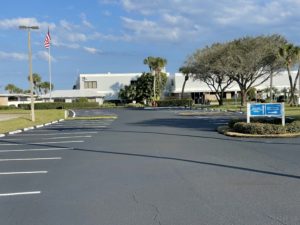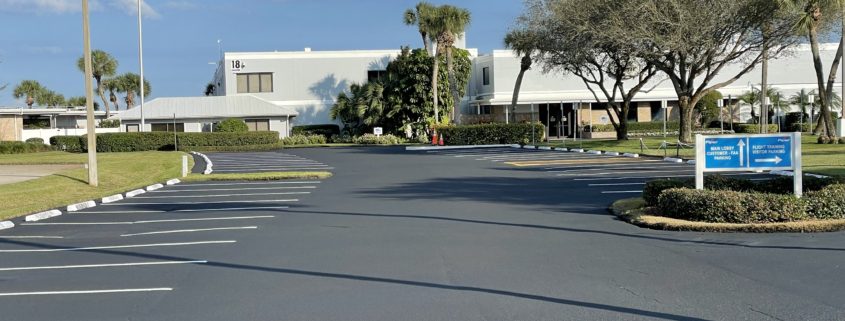Sealcoating: The Common Failures and Causes
 Asphalt pavements can last for decades if they receive the proper attention and professional maintenance. One of the best things you can do to ensure that your pavement ages gracefully is to have a high-quality sealcoat applied at regular intervals. Sealcoating can block harmful UV rays and vehicle fluids, and it can also enhance your pavement’s appearance. However, you want to work with a reputable, experienced contractor to reduce the chances that your sealant could fail to deliver the protection you expect.
Asphalt pavements can last for decades if they receive the proper attention and professional maintenance. One of the best things you can do to ensure that your pavement ages gracefully is to have a high-quality sealcoat applied at regular intervals. Sealcoating can block harmful UV rays and vehicle fluids, and it can also enhance your pavement’s appearance. However, you want to work with a reputable, experienced contractor to reduce the chances that your sealant could fail to deliver the protection you expect.
What Are Considered Sealcoating Failures?
Asphalt sealcoating contractors typically consider cracking, disbonding, peeling, and flaking to be sure signs that the seal coat has failed. However, there is no universal cause behind the different types of failures. A single cause could result in several different types of seal coat damage.
What Causes Asphalt Sealcoating to Fail?
One very common cause of failed asphalt parking lot sealcoating is inadequate preparation of the pavement prior to the sealant application. Applying asphalt paving lot sealcoating when the weather is unsuitable is another common cause of failure. Other causes include opening the pavement to traffic too soon, applying sealant at the wrong time, failing to make necessary pavement repairs prior to sealcoating parking lots or other asphalt pavements.
How Should a Pavement Be Prepared for Sealcoating?
Every pavement maintenance contractor should know that sealants absolutely cannot be applied unless the pavement is clean. This means that all sand, vegetation, trash, and other types of debris must be removed. If oil, fuel, brake fluid, or other automotive fluids have been leaked or spilled on the pavement, they must be removed, and they may need an application of an appropriate primer to enhance bonding.
What Weather Conditions Are Unsuitable for Asphalt Sealcoating Treasure Coast Pavements?
Unless the temperature is at least 50 degrees Fahrenheit and rising, your asphalt pavement maintenance contractor should not seal your pavement. Sealing a pavement at night or on a heavily overcast day can increase the risk of failure. Days featuring exceptionally high humidity levels and no wind also increase the risk of failure. Furthermore, sealants should not be applied if there is any chance of rain the day of or the day following the application.
How Could Opening the Pavement Too Soon Contribute to the Failure of an Asphalt Sealant?
Sealants will form a hard shell when they are given sufficient time to cure, but they are vulnerable until the shell has formed. Depending on the amount of curing that has taken place, allowing traffic to have access to the pavement can break the immature shell, or it can allow vehicles to remove the liquid sealant and carry it away on their tires.
Why Does Timing Matter for Asphalt Parking Lot Sealcoating?
If the pavement is new, it should not be sealed until the excess oil has been exhausted from the asphalt. This normally takes a minimum of three months, but it could take longer. If the pavement has been previously sealed, a new application should not take place until the existing sealant has started to wear away. This normally takes about two years, but some pavements may not need to be sealed for four or five years.
Why Are Repairs Needed Before Applying Asphalt Parking Lot Sealcoating?
If there is a hole in your home’s drywall or siding, you would not try to repair it by painting over it. Similarly, you cannot fix cracks or potholes by applying a seal coat. The sealant will simply drip into the breaks, leaving them open to the elements.
Why Do So Many People Trust Asphalt Care Services for Asphalt Sealcoating Treasure Coast Pavements?
There are many reasons to trust Asphalt Care Services for your paving needs. We are experienced and skilled, we have an exceptional staff, and we have an immaculate reputation for integrity, craftsmanship, and customer service. We have the knowledge, skills, and equipment to handle jobs of all sizes, and we stand behind our work. We offer many different paving services, including asphalt sealcoating, speed bump installation, asphalt paving, parking lot striping, traffic signs, asphalt repairs, thermoplastic striping, and bumper block installation. Give us a call at 772-888-2840, email [email protected], or submit the online form to request a free quote.




